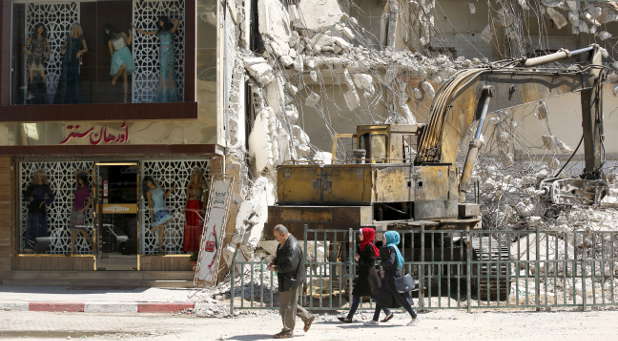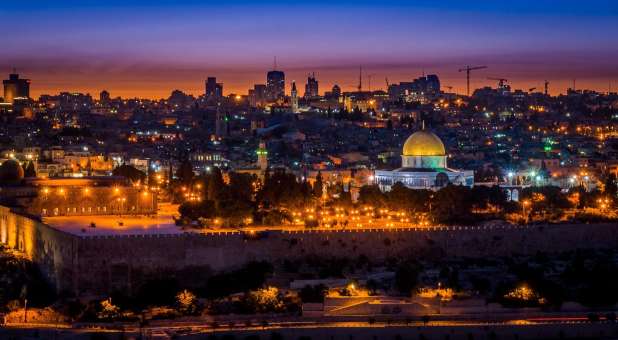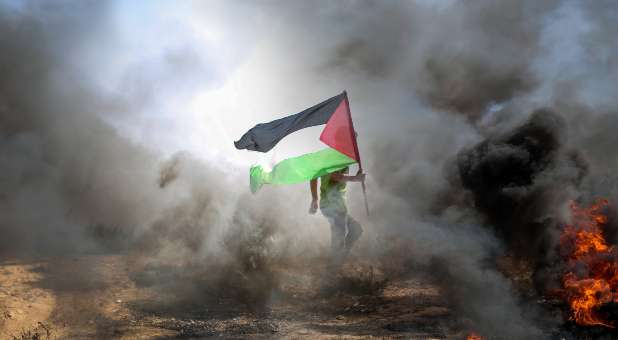When it comes to the security situation at Israel’s borders in recent years, no border has been more perilous for the Jewish state as its southern boundary with the Gaza Strip.
Israel unilaterally withdrew from Gaza in 2005, and the Palestinian terror group Hamas seized control of the coastal enclave in 2007. Since then, Gaza has given Israel three wars, thousands of rocket attacks and a network of cross-border terror tunnels that Hamas is now trying to rebuild.
Since the conclusion of the latest Israel-Hamas war in the summer of 2014, both Israel and the international community have taken steps to rebuild Gaza in order to ease the humanitarian situation there and prevent another conflict. But over the last several years, chaos in the rest of the Middle East has put the Israeli-Palestinian conflict on the back burner of regional priorities.
An April 2016 report published by the World Bank, titled “Reconstructing Gaza—Donor Pledges,” revealed that a number of leading Muslim nations have failed to live up to their pledges for the Gaza rebuilding effort. At a 2014 conference in Cairo, the international community pledged roughly $3.5 billion over three years for Gaza. But as of the end of March 2016, only $1.4 billion had been delivered compared to the scheduled $2.7 billion.
Several Arab states have fallen significantly short of their stated pledges for Gaza. Qatar, which promised the most aid at $1 billion, has so far only donated $152 million, the World Bank said. Saudi Arabia, the second-leading pledger, has delivered only 10 percent of its promise of $500 million. The United Arab Emirates (UAE) has sent 15 percent of its pledge of $200 million. Turkey, which is one of Hamas’ top international supporters, has delivered one-third of the $200 million it pledged.
By contrast, the United States has sent all of its pledged $277 million and the European Union has sent nearly three-quarters of its $348 million commitment.
“The Arab states are notorious for failing to deliver on the aid they promise to the Palestinians. This is a longstanding issue and one that has ultimately led the U.S. to remain as one of the leading donors to the Palestinians,” Jonathan Schanzer, vice president of research at the Foundation for Defense of Democracies (FDD) think tank, told JNS.org.
Following the World Bank report, the U.S. in May announced a new $50 million aid package for Gaza. According to American officials, the aid—which will be distributed by the U.S. Agency for International Development in conjunction with Catholic Relief Services—will be dispersed over five years to provide basic humanitarian assistance and to create jobs.
Ghaith al-Omari, a senior fellow at The Washington Institute for Near East Policy think tank and a former advisor to Palestinian Authority (PA) President Mahmoud Abbas, told JNS.org that the humanitarian situation in Gaza is “extremely dire, with no light at the end of the tunnel.” He cited a 2015 World Bank report that characterized Gaza’s economy as being “on the verge of collapse,” with an unemployment rate of 43 percent and 39 percent of the territory’s residents living in poverty. According to a 2015 United Nations Conference on Trade and Development report, Gaza could become “uninhabitable” by 2020.
Gaza’s reconstruction has been limited by a long list of factors, including a divided Palestinian movement, inter-Arab rivalries, regional turmoil, and the security blockade maintained by Israel and Egypt to prevent rockets and other weapons from reaching Gaza-based terror groups.
“Gaza reconstruction is one of those line items that is a certainty in wasting funds,” said FDD’s Schanzer. “The Hamas-led government starts to rebuild areas destroyed by Israel in the last conflict, then Hamas or some splinter group launches a war against Israel, prompting an Israeli reprisal. Anyone who looks at this as an investment would see it as a rather poor one, so there is that concern.”
Arab states’ support for the Palestinians “has often been generous but unpredictable,” al-Omari said. {eoa}
For the remainder of the original article, visit jns.org.
See an error in this article?
To contact us or to submit an article






















